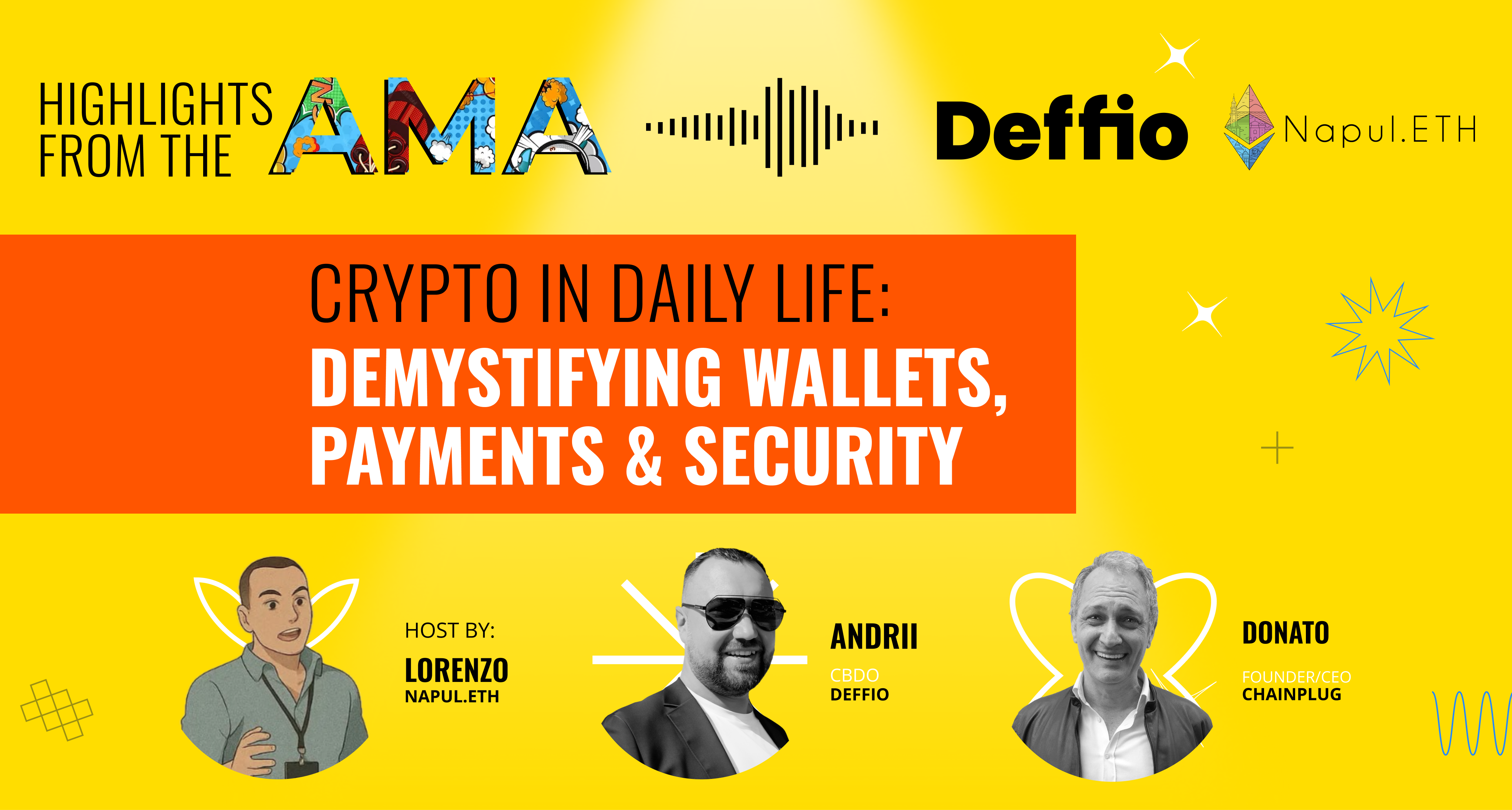What does it look like when crypto wallet app use shifts from theory to everyday life? When it’s not just about trading — but about paying rent, grabbing a coffee, or getting your salary?
That’s exactly what we explored during a live AMA on X, co-hosted by Deffio and NapulETH ahead of the main event in Naples, Italy. The session brought together Andrii Podobied (CBDO at Deffio), Donato Russo (Founder & CTO at Chainplug), and Lorenzo Ceppaluni (Co-founder of NapulETH) for a fast-paced conversation about real-world crypto transactions, self-custody, and digital assets security in the Web3 age.
Later, Andrii joined the NapulETH community in person. Representing Deffio as an official sponsor, he continued the dialogue face-to-face at our booth — showcasing the app, handing out rewards for the best AMA questions, and connecting with crypto newcomers and builders alike.
So… Can You Actually Live on Crypto?
🗣️ Andrii Podobied:
“I receive payments in crypto and use cards to pay in stores — legally and easily. It’s already real.”
Between a non-custodial crypto wallet like Deffio and upcoming crypto card integration, Andrii doesn’t just talk about mass adoption — he lives it. Tap, pay, move on. And with tools that let you buy crypto instantly, manage funds with multi-chain support, and plan spending like you would with fiat, it’s becoming easier than ever.
🗣️ Donato Russo:
“I earn tokens by walking with the Sweat app — I get rewarded for not polluting. It’s good for the planet and for health.”
For Donato, crypto is a snapshot of how you live. He sees a future where tokens show what you do, what you care about, and what you’re good at. Not just what’s in your wallet, but kind of like loyalty points, except way more personal.
Custody or Not? Choose Wisely.
🗣️ Donato Russo:
“We’re entering a phase where the EU will enforce digital identity protocols like eIDAS 2.0 — even banks will have digital passports.”
Regulations are catching up fast, especially in Europe. But as Donato pointed out, the weak point isn’t the tech: it’s us. Social engineering, phishing, and even blind trust are the actual security threats.
🗣️ Andrii Podobied:
“Everyone trusted FTX. A week before their collapse, they looked like the best exchange. But when they fell, people lost billions.”
It’s simple. If you don’t hold your private keys, you don’t own your money. Custodians can fail, go bankrupt, or vanish. That’s why Andrii now sticks with a non-custodial wallet — one where private keys control stays with the user.
Deffio makes this easier, with a user-friendly crypto app that supports multi-currency support app needs, not just ETH or BTC.
Too Much Power? Or Finally the Right Kind?
🗣️ Andrii Podobied:
“Five years ago, it wasn’t responsible to recommend non-custodial wallets to most users. But today, with so many bankruptcies and scams, people are starting to take security seriously.”
Let’s be honest — holding your own keys isn’t for everyone. It’s both power and pressure. One mistake, one lost seed phrase, and that’s it. But wallets are getting smarter, and users are getting savvier. And as Andrii explained, for real investing, OTC deals, or long-term savings — full control just makes sense.
🗣️ Donato Russo:
“Even though money is crucial, many people still hesitate to manage their own keys.”
Not everyone’s ready for full control — and that’s okay. For crypto newcomers or smaller holdings, custodial options still make sense. And let’s not forget: in the EU, regulated bank accounts are insured up to €100K.
🗣️ Andrii Podobied:
“With frameworks like MiCA, and more transparency around who’s behind crypto services, users can now make informed choices.”
Here’s the thing: regulation isn’t the villain. Done right, it gives people confidence and room to choose — whether they prefer a secure multi-chain DeFi wallet or a Web3 wallet with easier onboarding.
Web3 Security: Painful Lessons, Real Talk
🗣️ Andrii Podobied:
“I got an email saying I received tokens from a project I trusted. Instead of verifying the link, I Googled it, clicked the first result, and connected my wallet. It emptied instantly.”
That click cost him $1,000. The lesson? Stick with verified sources. Don’t trust links in emails. If a project isn’t verified, stay away. Crypto security often comes down to your personal hygiene — and your habits.
- Stick to trusted sources like CoinMarketCap
- Never click on email links — seriously, don’t
- If it’s not listed and verified, walk away
🗣️ Donato Russo:
“We think we can trust blockchain — but blockchain isn’t yet decentralized.”
Donato didn’t pull any punches. He reminded us that true decentralization is not merely an appearance, and it remains rare. Projects love the narrative, but users need to ask tough questions:
- Does the token do anything useful?
- Is there working tech behind the hype?
- Have you actually read the whitepaper?
🗣️ Lorenzo Ceppaluni:
“A friend of mine lost everything not through DeFi, but through a fake job application.”
The scam? Malware disguised as HR software. One click, and the wallet was drained. Web3 security isn’t just about wallets — it’s about digital hygiene across the board.
What This AMA Proved
This AMA was honest, full of the kind of conversations the crypto space actually needs. We had conversations with builders, skeptics, first-timers, and die-hard crypto users.
We left the session even more energized about where we’re headed. Because real crypto adoption doesn’t come from hype — it starts with honest conversations and products that actually make sense in everyday life.
Want a secure wallet that’s actually usable?
Deffio was built for humans, not just hardcore DeFi traders. Deffio is a secure, non-custodial crypto wallet that makes managing digital assets simple.
It’s a feature-rich wallet with multi-chain support, fast onboarding, and upcoming features like instant crypto swaps, staking, and even a non-custodial crypto card.
You can send crypto, receive crypto, and manage your digital assets with confidence — whether you’re a newcomer or crypto native.
Deffio is available for download on the App Store and Google Play.



